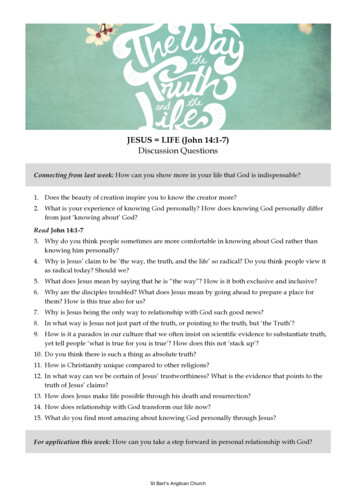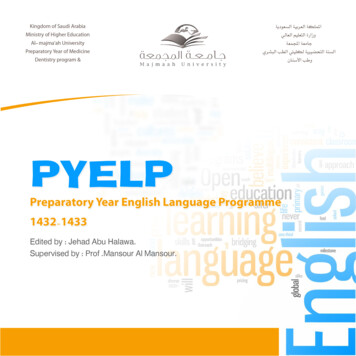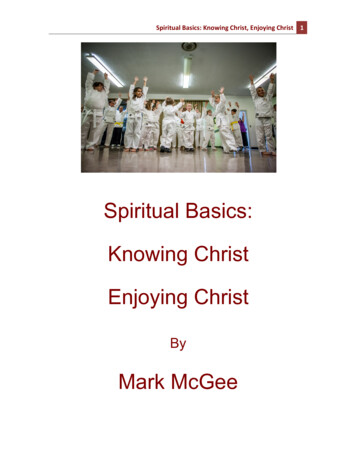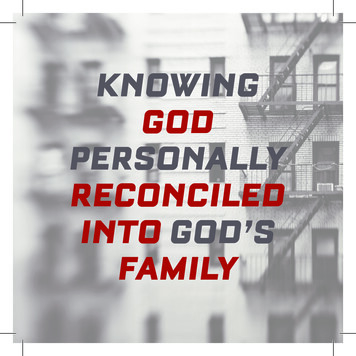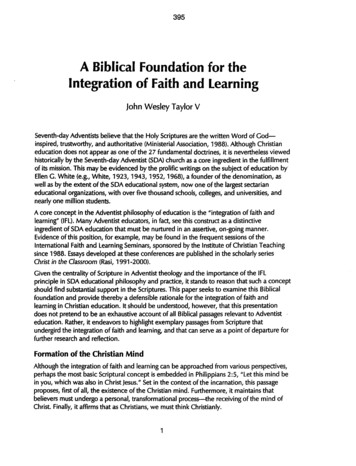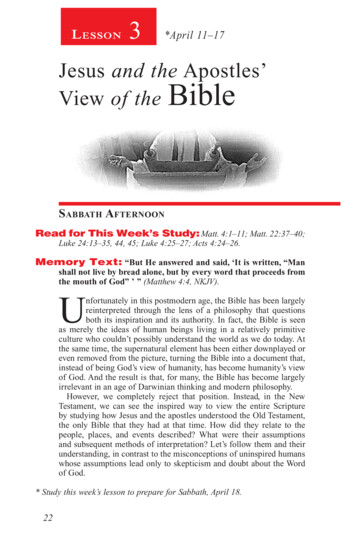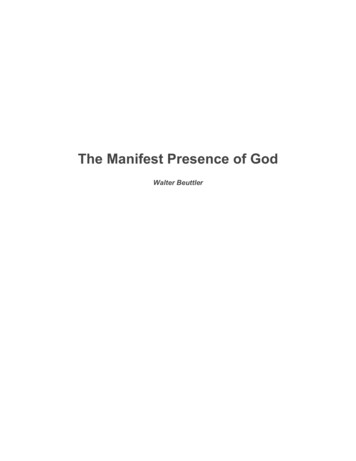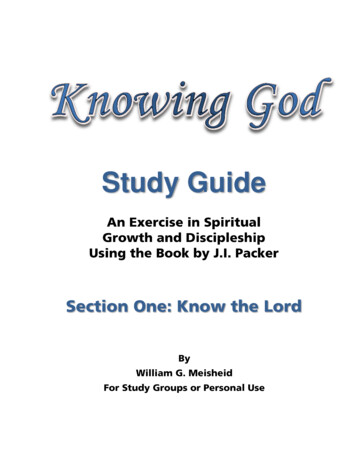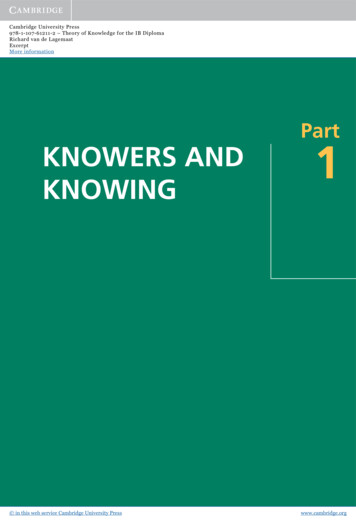
Transcription
Cambridge University Press978-1-107-61211-2 – Theory of Knowledge for the IB DiplomaRichard van de LagemaatExcerptMore informationKNOWERS ANDKNOWING in this web service Cambridge University PressPart1www.cambridge.org
Cambridge University Press978-1-107-61211-2 – Theory of Knowledge for the IB DiplomaRichard van de LagemaatExcerptMore informationThe problem of knowledge1The greatest obstacle to progress is not the absence ofknowledge but the illusion of knowledge.Daniel Boorstin, 1914–2004The familiar is not understood simply because it is familiar.Georg Wilhelm Friedrich Hegel, 1770–1831By doubting we are led to enquire, and by enquiry we perceivethe truth.Peter Abélard, 1079–1142All men have opinions, but few think.George Berkeley, 1685–1753Properly speaking, there is no certainty; there are only peoplewho are certain.Charles Renouvier, 1815–1903A very popular error – having the courage of one’s convictions;rather it is a matter of having the courage for an attack uponone’s convictions.Friedrich Nietzsche, 1844–1900Common sense consists of those layers of prejudice laid downbefore the age of 18.Albert Einstein, 1879–1955It is the customary fate of new truths to begin as heresies and toend as superstitions.T. H. Huxley, 1825–95There are two ways to slide easily through life: to believeeverything, or to doubt everything; both ways save us fromthinking.Alfred Korzybski, 1879–1950We know too much to be sceptics and too little to bedogmatists.Blaise Pascal, 1623–62 in this web service Cambridge University Presswww.cambridge.org
Cambridge University Press978-1-107-61211-2 – Theory of Knowledge for the IB DiplomaRichard van de LagemaatExcerptMore informationIntroductionIntroductionWe live in a strange and perplexing world. Despite the explosivegrowth of knowledge in recent decades, we are confronted bya bewildering array of contradictory beliefs. We are told thatastronomers have made great progress in understanding the universein which we live, yet many people still believe in astrology. Scientists claim thatthe dinosaurs died out 65 million years ago, yet some insist that dinosaurs andhuman beings lived simultaneously. Apollo 11 landed on the moon in 1969, but it isrumoured in some quarters that the landings were faked by NASA. A work of art ishailed as a masterpiece by some critics and dismissed as junk by others. Some peoplesupport capital punishment, while others dismiss it as a vestige of barbarism. Millionsof people believe in God, yet atheists insist that ‘God is dead’. Faced with such aconfusion of different opinions, how are we to make sense of things and develop acoherent picture of reality?Given your school education, you might think of knowledge as a relativelyunproblematic commodity consisting of various facts found in textbooks that havebeen proved to be true. But things are not as simple as that. After all, if you hadattended school one hundred or five hundred years ago, you would have learned adifferent set of ‘truths’. This suggests that knowledge is not static, but has a historyand changes over time.Yesterday’s revolution in thought becomes today’s commonsense, and today’s common sense may go on to become tomorrow’s superstition. Sowhat guarantee is there that our current understanding of things is correct? Despitethe intellectual progress of the last five hundred years, future generations may lookback on our much-vaunted achievements and dismiss our science as crude, our artsas naive, and our ethics as barbaric.KT – common sense:cultural beliefs andpractices generallyconsidered to be truewithout need for anyfurther justificationWhen we consider ourselves from the perspective of the vast reaches of time andspace, further doubts arise. According to cosmologists, the universe has been inexistence for about 13.7 billion (13,700,000,000) years. If we imagine that hugeamount of time compressed into one year running from January to December, thenthe earliest human beings do not appear on the scene until around 10.30 p.m. on 31December, fire was only domesticated at 11.46 p.m., and the whole recorded historyoccupies only the last ten seconds of the cosmic year. Since we have been trying tomake sense of the world in a systematic way for only a minute fraction of time, thereis no guarantee that we have got it right. Furthermore, it turns out that in cosmicterms we are also fairly small. According to astronomers, there are ten times morestars in the night sky than grains of sand in all the world’s deserts and beaches.Yet weflatter ourselves that we have discovered the laws that apply to all times and all places.Since we are familiar with only a minute fraction of the universe, this seems like ahuge leap of faith. Perhaps it will turn out that some of the deeper truths about life,the universe and everything are simply beyond human comprehension.3 in this web service Cambridge University Presswww.cambridge.org
Cambridge University Press978-1-107-61211-2 – Theory of Knowledge for the IB DiplomaRichard van de LagemaatExcerptMore information1The problem of knowledgeCommon senseMost people do not think that there is a problem of knowledge and they seeknowledge as nothing more than organised common sense. While there may besomething to be said for this view, the trouble is that much of what passes forcommon sense consists of little more than vague and untested beliefs that are basedon such things as prejudice, hearsay and blind appeals to authority. Moreover, manythings that at first seem obvious to common sense become less and less obvious thecloser you look at them.KT – mental map: apersonal mental pictureof what is true andfalse, reasonable andunreasonable, right andwrong, beautiful anduglyYet we need some kind of picture of what the world is like if we are to cope withit effectively, and common sense at least provides us with a starting point. We allhave what might be called a mental map of reality, which includes our ideas of whatis true and what is false, what is reasonable and what is unreasonable, what is rightand what is wrong, etc. Although only a fool would tell you to rip up your mentalmap and abandon your everyday understanding of things, you should – at leastoccasionally – be willing to subject it to critical scrutiny.To illustrate the limitations of our common-sense understanding of things, let usmake an analogy between our mental maps and real geographical maps. Consider themap of the world shown below, which is based on what is known as the MercatorProjection. If you were familiar with this map as you grew up, you may unthinkinglyaccept it as true and be unaware of its limitations.Figure 1.1 The Mercator Projection4 in this web service Cambridge University Presswww.cambridge.org
Cambridge University Press978-1-107-61211-2 – Theory of Knowledge for the IB DiplomaRichard van de LagemaatExcerptMore informationCommon senseACTIVITY 1.11. Think of as many different ways as you can in which the world map shown inFigure 1.1 is:a. inaccurateb. based on arbitrary conventionsc. culturally biased.2. Do you think it would be possible to make a perfect map of a city? Whatwould such a map have to look like? How useful would it be?Among the weaknesses of the map in Figure 1.1 are the following:1. It distorts the relative size of the land masses, so that areas further from theequator seem larger than they are in reality. The distortion is most apparent whenwe compare Greenland to Africa. According to the map they are about the samesize, but in reality Africa is fourteen times bigger than Greenland.2. It is based on the convention that the northern hemisphere is at the top of themap and the southern hemisphere at the bottom. Although we are used to thisway of representing things, the reality is, of course, that the world does not comewith a label saying ‘This way up’!3. The map is Eurocentric in that it not only exaggerates the relative size of Europe,but also puts it in the middle of the map.Now compare the Mercator Projection with another map of the world, known asthe Hobo-Dyer Equal Area Projection (Figure 1.2).Figure 1.2 The Hobo-Dyer Equal Area Projection5 in this web service Cambridge University Presswww.cambridge.org
Cambridge University Press978-1-107-61211-2 – Theory of Knowledge for the IB DiplomaRichard van de LagemaatExcerptMore information1The problem of knowledgeThis projection accurately reflects the relative sizes ofthe land masses (although it distorts their shape); it hasthe southern hemisphere at the top and the northernhemisphere at the bottom; and it is centred on thePacific rather than Europe. The fact that most peoplefind this map disorienting illustrates the grip thathabitual ways of thinking have on our minds and howdifficult it is to break out of them.The point of this excursion into maps is to suggestthat, like the Mercator Projection, our common-sensemental maps may give us a distorted picture of reality.Our ideas and beliefs come from a variety of sources,such as our own experience, parents, friends, teachers,Figure 1.3 The Treason of Imagesbooks, the news media – and, of course, the internet.Since we don’t have time to check up on everything to make sure that it is true,there are likely to be all kinds of inaccuracies, half-truths and falsehoods woven intoour mental maps. Furthermore, it can be difficult for us to think outside the customsand conventions with which we are familiar and see that there may be other waysof looking at things. Finally, there may be all kinds of cultural biases built into ourpicture of the world. If you ask an English person to name the greatest writer andgreatest scientist of all time, they will probably say Shakespeare and Newton. If youask the same question to an Italian, they are more likely to say Dante and Galileo.Meanwhile in China they will boast about their four great inventions – the compass,gunpowder, paper-making and printing – and urge you to read The Dream of the RedChamber by Cao Xueqin (1715–1763).One final point to draw out of this discussion is that, while different maps may bemore or less useful for different purposes, there is no such thing as a perfect map. Aperfect map of a city which included every detail down to the last brick and bladeof grass would have to be drawn on a scale of 1:1. Such a map would, of course, beuseless as a map, and would in any case quickly become out of date. We might callthis the paradox of cartography: if a map is to be useful, then it will necessarily be imperfect.There will, then, always be a difference between a map and the underlying territoryit describes. To sum up in a well-known slogan that is worth keeping in mindthroughout this book: ‘the map is not the territory’.ACTIVITY 1.21. What relevance do you think the slogan ‘the map is not the territory’ has toour search for knowledge?2. Look at the painting The Treason of Images (1928–9) by the Belgian surrealistRené Magritte (1898–1967). What do you think of the title of the painting?What has this got to do with our discussion?6 in this web service Cambridge University Presswww.cambridge.org
Cambridge University Press978-1-107-61211-2 – Theory of Knowledge for the IB DiplomaRichard van de LagemaatExcerptMore informationCertaintyCertaintyIf there are problems with our common-sense picture of the world, perhaps weshould abandon our everyday understanding of things and limit ourselves to what iscertain. For it has often been thought that certainty is what distinguishes knowledgefrom mere belief. The idea here is that when you know something you are certain itis true and have no doubts about it; but when you merely believe it, you may think itis true, but you are not certain. At first sight, this seems reasonable enough; but whenyou start to look critically at the things we normally claim to know, you may beginto wonder if any of them are completely certain!ACTIVITY 1.3List in order the five things in life that you are most certain of. Compare yourlist with someone else’s. Can you come to any agreement?RLS – Headline:‘Mysterious UFO overDenver Puzzles AviationExperts’. Is it reasonableto believe in UFOs?Consider, for example, the following four statements:1. I know that Neil Armstrong landed on the moon in 1969.2. I know that strawberries are red.3. I know that if a is bigger than b and b is bigger than c, then a is bigger than c.4. I know that murder is wrong.I imagine you would say that all of the above statements are true. But how do youknow? You might say that you know that Neil Armstrong landed on the moonin 1969 because you read about it in an encyclopaedia or online; you know thatstrawberries are red because you can see that they are red; you know that if a isbigger than b and b is bigger than c, then a is bigger than c because you can reason itout; and you know that murder is wrong because it is intuitively obvious. However,if you ask yourself whether you are 100 per centcertain that these statements are true, doubts may beginto creep in. A quick look at four key ways of knowing– language, sense perception, reason and intuition –suggests that they cannot simply be taken at face value.KT – ways of knowing:the eight possible waysof acquiring knowledgeoutlined by the Theory ofKnowledge – language,reason, perception,intuition, emotion,memory, imagination,faith1 LanguageLanguage enables us to acquire knowledge from otherpeople, and we claim to know a great many thingsbecause we have been told them or we have read themsomewhere. However, the authority of other people isnot always a reliable source of knowledge, and even theso-called experts sometimes ‘get it wrong’. If you areinto conspiracy theories, you might ask how we canbe sure that the alleged American moon landings werenot an elaborate CIA-inspired hoax.Figure 1.4 How sure are you that the Americans landed on themoon?7 in this web service Cambridge University Presswww.cambridge.org
Cambridge University Press978-1-107-61211-2 – Theory of Knowledge for the IB DiplomaRichard van de LagemaatExcerptMore information1The problem of knowledge2 Sense perceptionMuch of our knowledge is based on personal experience, but our senses sometimesdeceive us. For example, if you are colour blind, you might not see strawberries asred. We shall have more to say about this in Chapter 5. For the time being, you mightlike to consider Figure 1.5.Figure 1.5Believe it or not, the two table tops are exactly the same shape and size. This suggeststhat we should not blindly trust our perception and assume that it gives us certainty.3 ReasonStatement 3 above might seem less open to doubt than the others, and somephilosophers have claimed that reason gives us greater certainty than perception. Inpractice, however, people do not seem to be very good at abstract reasoning and theyare liable to make all kinds of errors. To illustrate, assuming that some dentists aredrunkards and no cyclists are drunkards, does it follow that some cyclists are dentists?The answer is that it does not – but we may well struggle to see that this is true.4 IntuitionSome of the things that we claim to know strike us as intuitively obvious. Thetrouble is that what is intuitively obvious to me may not be intuitively obviousto you.You only have to consider debates about such things as abortion or capitalpunishment to see the extent to which people may have conflicting intuitions onimportant issues. And it would surely be arrogant simply to assume that my intuitionsare right and yours are wrong.We can mention four other possible ways of knowing which, like those listed above,are important sources of knowledge, but may not be entirely reliable.5 MemoryOur knowledge about the past is based on memory. Indeed, there is a sense inwhich all of our knowledge – intellectual as well as autobiographical – is based onmemory. If we literally forgot everything, we would know nothing. Despite their8 in this web service Cambridge University Presswww.cambridge.org
Cambridge University Press978-1-107-61211-2 – Theory of Knowledge for the IB DiplomaRichard van de LagemaatExcerptMore informationRadical doubtimportance, our memories are notoriously unreliable and we often complain aboutthem. We quickly forget the details of many of our experiences and sometimes even‘remember’ things that never happened.6 EmotionEmotions play a crucial role in our lives and they shape and colour our perceptionsand values. A person without emotions who was, say, unable to see a terrorist attackas frightening would surely be deficient in knowledge. At the same time, emotionscan easily distort our perception of reality and act as an obstacle to, rather than asource of, knowledge. When angry people argue with one another, they produce agreat deal of heat but very little light.7 ImaginationImagination is relevant to knowledge in that it is the source of creative ideas. Agreat deal of intellectual progress is the result not of discovering new things but ofnew ways of looking at existing things. Consider, for example, the famous insightby Copernicus (1473–1543) that the earth revolves around the sun rather than viceversa. However, when imagination is not tested against reality, there is a danger thatwe end up replacing public facts with private fantasies. The claim that the singerMichael Jackson faked his own death and is in fact still alive would seem to fit intothis category.8 FaithFor many people, faith is the basis for at least some of their knowledge claims aboutreality. Indeed, it could be argued that our most fundamental beliefs are ultimatelymatters of faith. Nevertheless, such knowledge claims contradict one another andwhat one person calls faith, another person might call superstition. In general, wemay worry that, unless they are informed by reason, appeals to faith can be used tojustify any belief.RLS – Headline:‘Superstitions andBeliefs of IndianSpace Scientists’. Aresuperstitions irrational?Radical doubtSo far, we have raised some preliminary doubts about knowledge based on the eightways of knowing mentioned above. But, following the French philosopher RenéDescartes (1596–1650), there is perhaps one statement that you think is absolutelycertain – namely that ‘I exist’. Surely that is something that cannot sensibly bedoubted?It could be argued that we cannot even be sure about that! In the 1998 movie TheTruman Show a character called Truman Burbank lives on an island called Seahavenand leads an apparently ordinary life. As the movie progresses, we learn that Truman’sentire life is being filmed 24 hours a day and broadcast live on TV, and that his wife,family, friends and acquaintances are all paid actors. Truman himself is unaware of9 in this web service Cambridge University Presswww.cambridge.org
Cambridge University Press978-1-107-61211-2 – Theory of Knowledge for the IB DiplomaRichard van de LagemaatExcerptMore information1The problem of knowledgethis and he mistakes his illusory world for reality. So how can you be certain thatyou are not living a Truman-Show-type life and that the people around you are notsimply actors? Some philosophers have even speculated that the whole of life mightbe a dream. Perhaps you will awake in a few minutes and realise that you have beenhaving the strangest dream in which you were a creature called a human being,living on a planet called Earth. Although such a radical supposition does not provethat you do not exist, it does suggest that your life might be completely differentfrom what you thought.ACTIVITY 1.41. Do you think it is seriously possible that you could be dreaming right now?2. Do you think that some areas of knowledge are more certain than others?RelativismKT – relativism: thetheory that people’sideas of what is true orvaluable are not absolutebut depend on theircultureSometimes people react to this lack of certainty by swinging to the opposite extremeand embracing a position known as relativism. According to relativism, there is nosuch thing as absolute truth that exists in an objective way independent of whatanyone happens to believe is true. Instead, truth is relative and may be different fordifferent individuals or for different cultures. So rather than say that something istrue or false in an unqualified way, the most we can do is say that it is ‘true for me’ or‘false for you’. Since there are no grounds for saying that one opinion is better thananother, we must therefore conclude that all points of view are of equal value.Since there are disputed questions in all areas of knowledge, relativism might at firstseem an attractive position. Rather than insist that I am right and you are wrong, it issurely more attractive to say that one and the same knowledge claim can be true forme and false for you?Despite its attractions, relativism leads to as many difficulties as equating knowledgewith certainty. Consider the question of whether or not the earth is round.According to a relativist we would have to say it is true for me and false for agoodbadbadgoodFigure 1.6 Is everything relative?10 in this web service Cambridge University Presswww.cambridge.org
of looking at things. Finally, there may be all kinds of cultural biases built into our picture of the world. If you ask an English person to name the greatest writer and greatest scientist of all time, they will probably say Shakespeare and Newton. If you ask the same question to an Italian, they are more likely to say Dante and Galileo.
